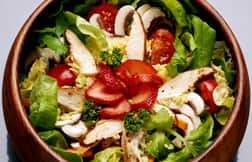| Chronic inflammation The New England Journal of Medicine published several studies in the year 2000 showing that the blood indicators of inflammation are strong predictive factors for determining who will suffer a heart attack (Lindahl et al. 2000; Packard et al. 2000; Rader 2000). The January 2001 issue of Life Extension magazine described these studies and explained how individuals could protect themselves against these inflammatory markers (such as C-reactive protein, homocysteine, and fibrinogen). Scientists have identified dietary supplements and prescription drugs that can reduce levels of the pro-inflammatory cytokines. The docosahexaenoic acid (DHA) fraction of fish oil is the best documented supplement to suppress TNF-a, IL-6, IL-1(b), and IL-8 (Jeyarajah et al. 1999; James et al. 2000; Watanabe et al. 2000; Yano et al. 2000). In addition to toxic cytokines, there are other inflammatory pathways that can be mediated via diet modification. A common problem involves overproduction of pro - inflammatory hormone-like "messengers" (such as prostaglandin E2) and underproduction of anti-inflammatory "messengers" (such as prostaglandin E1 and E3). The good news is that omega-3 fatty acids found in fish oil help to suppress the formation of undesirable prostaglandin E2 and promote synthesis of beneficial prostaglandin E3 (Kelley et al. 1985; Watanabe et al. 2000). Gamma - linolenic acid (GLA) induces production of the anti-inflammatory prostaglandin E1 (Das et al. 1989; Fan et al. 1997). What you eat can significantly affect whether you have more of the beneficial prostaglandins (E1 and E3) as opposed to the pro-inflammatory prostaglandin E2. | Events Second Annual Life Extension Cruise The second Life Extension Seminar at Sea will be a 7-night cruise on August 29, 2008. This time we will cruise the splendor of the Alaskan wilderness aboard Celebrity’s sumptuous Infinity. You’ll enjoy our Life Extension seminars, one-on-one consultations, a welcome aboard cocktail reception, exceptional personal service, award-winning cuisine, world-famous amenities, accommodations that are the most spacious at sea, and much more. Experience the extraordinary: Celebrity Travel press, such as Condé Nast Traveler, consistently rate Celebrity Cruises as one of the world's finest cruise lines. Celebrity offers an incomparable cruise experience aboard ships of uncompromising style and sophistication. From spectacular dining to indulgent spa treatments, you’ll find countless possibilities to satisfy body and soul. Sleep upon Egyptian cotton linens, enjoy butler service in all suites, or special amenities with Concierge Class staterooms, dine in award-winning restaurants, pay a visit to Fortunes Casino, experience Las Vegas-style shows or a movie in the cinema, be pampered by Celebrity's exclusive AquaSpa programs, and much more. Your ship: Infinity Onboard the Infinity luxury reigns. Every grand deck is lavishly finished in wood and marble, etched glass, and polished granite. Original works of art are on exhibit throughout the ship. From the Grand Foyer to the premiere dining restaurant, The United States, every aspect of the Infinity is magnificent. Unique Features: The Conservatory: Perched high above the sea, the Conservatory is a flourishing, breathtaking garden featuring the exclusive collection of world-renowned floral designer, Emilio Robba. SS. United States Restaurant: Tantalizing cuisine served in a most exquisite setting. Reminiscent of transatlantic ocean liners of the past, the SS United States Restaurant will whisk you back in time. For reservations or for more information please call Life Extension Vacations at 800-791-4457 or email reservations@levacations.com. https://www.lifeextension.com/event http://www.levacations.com |
















